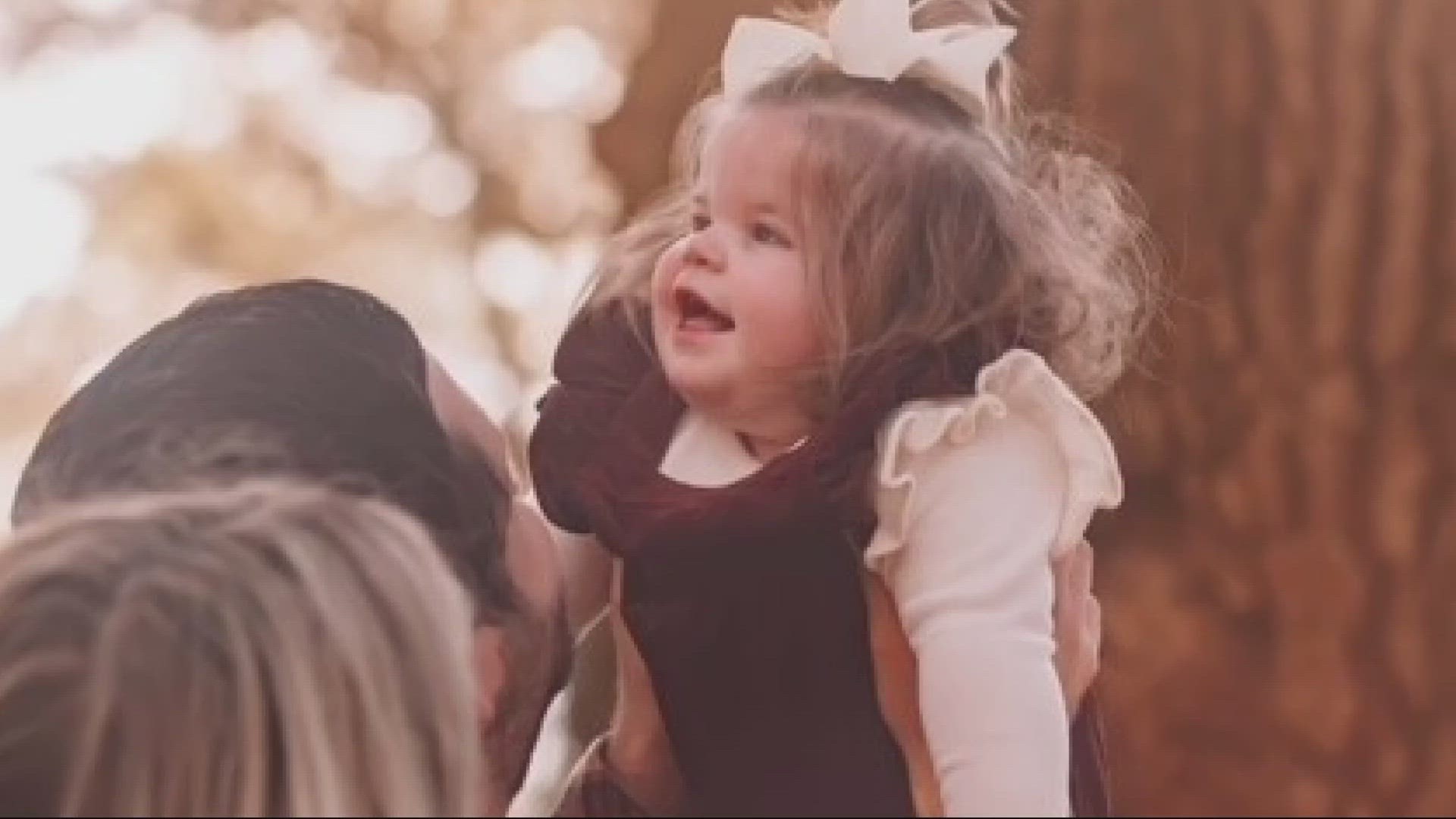JACKSONVILLE, Fla. — Harlow Higbee may not be able to tell you what she likes, but her smile speaks volumes.
Her parents, Rick and Kim Higbee, say immediately after Harlow's birth doctors noticed low muscle tone, but testing didn’t identify a problem. Then at six-months-old, an MRI showed one side of the brain was larger than the other.
"So that was the first like alright, something is really wrong," tells Kim Higbee.
It would be another three months before genetic testing would reveal that Harlow has Pyruvate Dehydrogenase Complex Deficiency. More commonly called PDCD for short, it is an extremely rare mitochondrial metabolic disease.
"It is scary because there is no cure, we kind of didn’t know who to turn to ask questions," tells Higbee.
The family met with Dr. Pamela Trapane, the Chief of the Division of Pediatric Genetics with UF Health Jacksonville. She says with PDCD there is a problem in one of the primary steps that converts food into energy in the body.
"There are a lot of different steps in there, a lot of different places, a lot of different conditions, but this is one of the critical steps to make that energy," explains Trapane.
Children with PDCD can’t metabolize carbohydrates, so lactic acid builds up to a dangerous level in their organs and robs them of energy. The disease usually attacks the brain first and then the muscular system and in severe cases can cause seizures.
To understand it better, Trapane says to think of the enzymes like bridges- if a bridge is gone, cars pile up on one side. That build up can cause harm to the body and no cars are getting to the other side either, so food isn’t being made into energy.
Harlow was put on a ketogenic diet which Trapane says is basically trying to train the body to create energy differently. The Higbees say it has made a difference for Harlow, but they are discouraged by how little research has been done into PDCD.
The last study done was around 15 years ago at the University of Florida.
"There is not the money to fund this research because it is such a small population," explains Higbee.
Even fundraising has been a challenge with large businesses and donors telling them PDCD is simply too rare.
"It doesn’t meet the criteria for some big businesses because it is such a small population," says Higbee with frustration," But that is why we need help."
So the Higbees, and other PDCD families, now meet through social media and are taking on the challenge of raising money for research themselves. The University of Texas Southwestern started a gene therapy mice study in November with a price tag of around $500,000.
If that is successful it could open the doors to interest biotech companies and bring in grants.
Trapane says the selflessness and altruism of families raising money to study rare disease is powerful, because by the time the trials and research are done it may not be able to help that family's child, but it could extend or save the life of the next child with the rare disease.
"I have lived long enough in this field to know that has been true. There are children we used to give diagnosis to and we didn’t expect to live more than a year and now there are effective treatment for them and it has been 20 years," explains Trapane.
The Higbee family says they will never stop fighting to bring awareness to PDCD. Big sister, Cassidy Higbee, already says she wants to be a doctor someday.
Looking toward the future, the Higbee family has a simple Hope for Harlow.
"I pray Harlow is still here in 10 years, I hope we get to the point of having a cure. For her, you can’t regain some of the brain damage that’s there, but if she gets the gene replacement, you could get her off the ketogenic diet," explains Higbee," I hope she is out there fighting for other rare disease at that point."
The Higbee family says they also want to see PDCD added to newborn screenings because the earlier it is discovered the better the outcome will be.
They are having a fundraiser March 28, Clays for Cure, at Jacksonville Clay Target Sports and are still open to more teams. It is $800 for a team of four or $225 for an individual. You can also buy just a lunch ticket for $25. For more information call 904-860-2388.
You can also donate directly to PDCD research at www.HopeForPDCD.org

